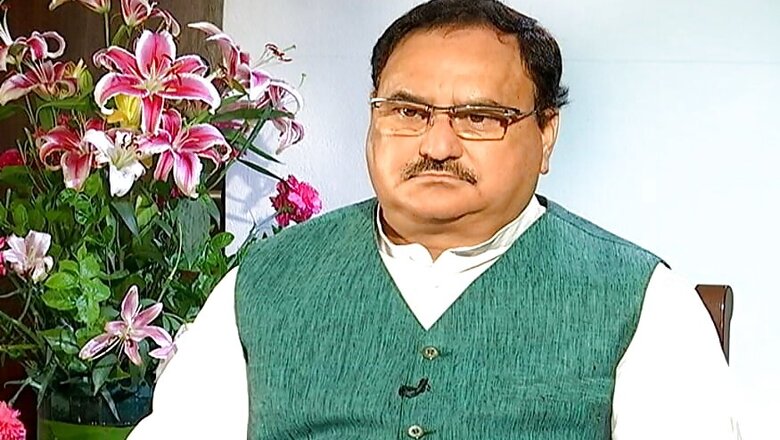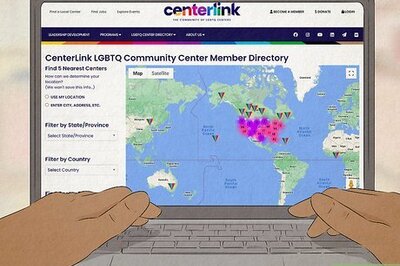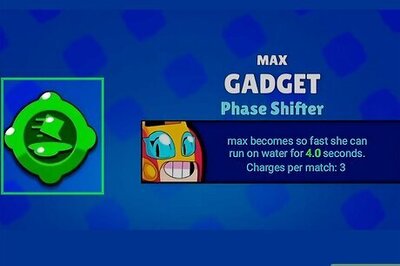
views
New Delhi: The Lok Sabha passed the Mental Healthcare Bill, 2016, that decriminalises suicide, and bans the use of shock treatment on children suffering from mental illnesses, earlier this week. The bill also provides for mental health care and services for persons suffering from mental illnesses.
In an exhaustive conversation with CNN-News18's Marya Shakil, Union Health Minister JP Nadda talks about the new bill decriminalising suicide, the state of health as a fundamental right, and explains why there was a need for a patient-centric bill.
Here are the excerpts:
MARYA: It's being called healthy law making as the parliament witnessed extensive debate over the mental healthcare bill. With me is Health Minister JP Nadda to talk about the various initiatives and also the mental health bill in particular. Sir, the key takeaway of the mental healthcare bill is that it decriminalizes attempt to suicide. Psychiatrists, though, are saying that not every attempt of suicide is a case of depression, and that there are several cases of some kind of personality disorder, attention seeking etc. How will you respond to those apprehensions?
NADDA: As far as the issue that came forward in the discussion when this bill was being drafted, we had consulted all stakeholders and we came to a confirmed opinion that suicide is done when in an acute stage of stress and so it needs to be decriminalised. After discussions with doctors, specialists, stake holders, we came to this opinion, and I think it's a progressive step, it is a humane decision and it reflects that we are seeing the person who commits suicide as a mentally ill patient at that point in time. And it has to be seen that he is not taken as a criminal, this act should not be taken as criminal, that's why we said it should be decriminalised.
MARYA: You've said that this is a patient-centric bill, a number of psychiatrists we spoke to say that this will impact the relationship between patient and doctor and that patient determines his course of treatment, which means that there will be suspicion, doubt and that the doctor will perhaps be on the defensive.
NADDA: I think the psychiatrists have not understood the right perspective in which it is said to be a patient-centric bill. Patient-centric bill means that patient will have right of advance directive i.e. when the patient is sane he/she has to decide what course of action or what relief he needs or how he is to be addressed, admitted in an institution or treated in the community itself. But that does not mean that psychiatrist or doctor will be asked to administer a particular kind of drug or kind of treatment
MARYA: Line of treatment?
NADDA: Line of treatment will never be decided by patient. He can only decide where he wants to be treated, who the persons treating him will be, but the line of treatment is exclusively with the doctors and that does not mean when we say advance directive the directive is how he should be treated, not what treatment is to be given or what medicines are to be administered. This is only in the domain of doctors and this is a wrong notion which has been there with psychiatrists that need to be removed
MARYA: Another aspect is changing the mindset, mental illness or depression wasn't really seen as acceptable, there's a taboo attached to it. Do you think there is a need for training? Will you ensure that police will be trained such that they see suicide as a cry for help?
NADDA: Certainly, what we want to do is... we want to shift two things about bill that are now becoming an act- One: patient-centric, advance directive- patient will tell what kind of treatment he needs, what environment he needs, he will have right of nomination, who will take care when he is ill... you were talking about the community- Two: we are shifting the treatment from institution to the community, when we shift patient to community, it’s not only the police, the Asha workers, the caregivers, for the first time, care givers have been recognized and taken on board- so all these people need to be sensitized
MARYA: sensitization and training?
NADDA: Yes, that is a very important component, but we are now making it a legally acceptable thing where we will legally give position to the patient, that he cannot be coerced or forced and he has to be treated in the community and in the community the people who take care are to be trained and sensitized... even the police.
MARYA: But sir, the concern is also about the doctor-patient ratio. There's 1 psychiatrist for every 5 lakh Indians. How will you handle that number, the disparity?
NADDA: It’s not just with psychiatry it is with other disciplines also, we are going in a big way. This year itself. More than 5000 seats of post graduate have been enhanced and we are going very fast on it. We are trying to see to deregulation in the sense that we want to relax norms so the number of students increases and the PG students increase so we are able to cater to it. There is a backlog, all this should have been done some 10 years back, 15 years back.
MARYA: UPA didn't function?
NADDA: At this point in time, it's a debate where I have to focus on mental health care not talk about UPA, but yes, it should have been done much before, which it has not been done, but better late than never, we are going forward
MARYA: Talking about educational institutions or corporate offices, how will they really examine a patient suffering from mental illness or some kind of ailment?
NADDA: This act or bill gives a position where the patient will be given a safe workplace and we have to see that safety is provided accordingly and it is the behavioural part that tells us about the changes in the patient. They will have to report that. It is for the individual or family or institution which has to take care.
MARYA: This is not retrospect. A number of cases of attempt to suicide, legalities, how do you plan to address these?
NADDA: Yes, this is prospective. Certainly, when a law comes it has to be when it is enacted, only after it happens. So we can’t think about the retrospective cases, we have to think about prospective cases. But yes, in the light of it, it is the judiciary which has to decide the cases and they can understand what the prospective law is.
MARYA: Talking about the national health policy, you have said that health as a fundamental right cannot... was removed in fact from national health policy 2017, though it was part of the draft policy of 2015, keeping in mind the absence of infrastructure. At a time when your government is talking about digital media, start-up India, don't you think the time has come for health as a fundamental right?
NADDA: I will be very clear... talking about fundamental rights and just taking a political advantage of it is not correct. We should live in reality, and we should do what we can do. We are working in a way where it is reaching the stage of a fundamental right, we are giving them health assurance. We have made universal screening which is a major step. We have increased budget. We are also trying to see to it that health facilities like drugs and diagnosis are provided to the common man and poor man. So in a way, all type of health assurances are being given. We want to be practical, not come out with a policy and then say we cant do it at this point of time.
MARYA: In two years? Perhaps at the end of the first term, there is a possibility of health as a fundamental right?
NADDA: What I will say is that by the end of this term, we will make health an assured facility to be given to every citizen of the country.
MARYA: Talking about National health policy, it talks about regulating private sector and grading private and government hospitals, how do you plan to go about this regulation and grading?
NADDA: Not just plan, we are working on it. We have graded government hospitals, we know what type of facilities, we have graded accordingly. And now we are trying to see to it which institutions fall under which grade and the same way we'll do for private hospitals. The norms are there we only have to develop the infrastructure to see how to regulate. The regulation, protocol are ready. What we have to do is put things in place and we will do it.
MARYA: The ministry's flagship programme, the national health mission faces an uncertain future with the end of the 12th 5-year plan on March 31. Can the government really afford to do away with such a massive initiative?
NADDA: I don't think there is any thinking of doing away with NHM. It is a very important programme of health ministry. It has given very good results, we have been able to see to it that the indicators show there is a decline in IMR, MMR, under 5 mortality... very good indicators are there. In fact, we are going faster than the world pace on these parameters so we are going to continue with it.
MARYA: In February, the National Technical Advisory Group on Immunization, the government's highest body on immunisation, cut financial ties with the Bill and Melinda Gates Foundation, because of the foundation's ties with pharmaceutical companies. Did it have to do with the concerns raised by the Swadeshi Jagran Manch?
NADDA-No our central supervisory board takes care of all these things and we work on their advice.
MARYA-There's been a lot of criticism of the recent HIV bill, especially of the clause 14(1)" as far as possible regarding the centre and states responsibility to ensure diagnosis and ART treatment. The community is worried that the government will see this as an escape route and not do their utmost to provide free and complete and free treatment. This fear has been compounded by regular stock-outs of testing kits and medicines even in Delhi hospitals.
NADDA-I would like to clear here that we believe in practical things, this is not mine but standing committees opinion that we should write as far as possible, but as for the government, we have decided that we will have test and treatment programme, Earlier, when I took over the CD4 count was 350 then ART used to start which is Anti Retro Viral treatment but we increased it to 500 counts and the moment we get to know a person has HIV virus the treatment will start. So we are giving them universal treatment, we are giving them free treatment. As far as possible, it has been said in terms of the practical procedure. We will give free and complete treatment. There should be no doubts about it because of this clause, even among patents and health activists.
MARYA- To the regulatory bodies - Dental and Medical councils of India need a revamp - the current DCI chairman has an FIR... that the regulatory body is vested... how will you clean up the system with its members facing questions on themselves - conflict of interest is the charge.
NADDA- We are on the way, we have drafted a bill called National Medical Commission, and discussion is going on. Very soon, we will be bringing it to the cabinet and we will bring it to the parliament. At this point in time, these are all autonomous bodies and it is they who regulate and we work accordingly. But there are changes in National Medical Commission so NMC will take care of all these things. All issues are being taken care of.
MARYA- Is this an area of concern? How soon will the bill come?
NADDA- of course, it is. The bill will come as soon as possible. NITI Aayog has worked on it. Many new aspects are taken into consideration.
MARYA-What happened in Maharashtra? Doctors going on strike because of the assault they face from attendants and patients...Why is there always such a harsh reaction to these strikes? The Bombay High Court said that hospital management could take action against the striking doctors and last year, the Delhi government threatened doctors with invoking Essential Services Maintenance Act.
NADDA-No, I think states will have to be more proactive. They have to talk not only with doctors but they have to provide security as well, this is condemnable. This is a serious concern and I have spoken to CMs. I have spoken to health minister also to see to it to provide an environment to see to it that doctors work in a congenial environment and to provide them security also.
MARYA- Private hospitals also charge exorbitant amounts for treatment. Will you assure the people that this treatment cost will come down?
NADDA-We have taken many steps. We provide them subsidized and quality medicines through Amrit. We have reduced prices of stents and we are doing it for others also. But as far as private institutes are concerned. We have a clinical establishments act that has to be adopted by states. The moment they adopt it and adhere, things will improve.




















Comments
0 comment